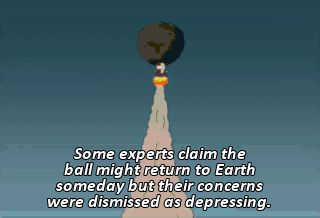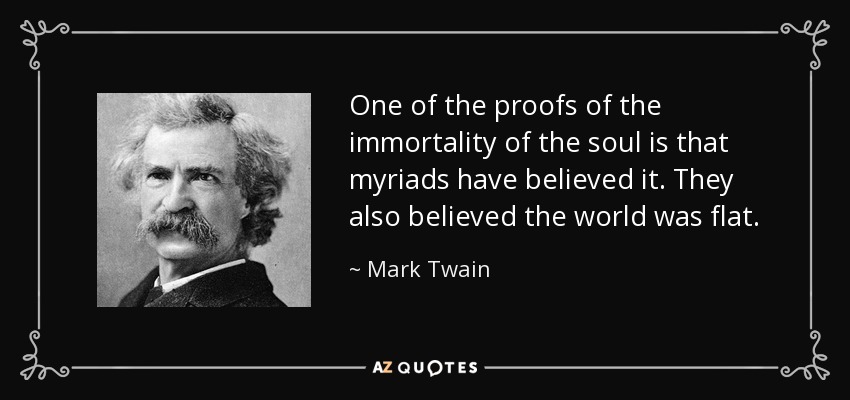Survival Researcher or Christian Apologist? Could You Tell the Difference? (Part 2 of 3)
Continued from last time…
6. It’s Depressing, Therefore It’s False

In my opening critique I quoted Dean Radin and co. stating: “Materialism tells us that there is no purpose to anything. When we die, we are forever extinguished, and our atoms are recycled into other purposeless creatures. Eventually, all the suns will burn out, the universe will grow cold, and by a random fluke, the whole meaningless cycle might begin again” (p. 33). What relevance does this true statement have to whether or not survival researchers are able to provide strong evidence for the existence of an afterlife? Does this appeal to emotion sound familiar?
Like psychical researchers leaning on the same trope, in his opening statement in the Lowder-Fernandes debate above, Christian apologist Phil Fernandes seems to confuse the depressing with the meaningless. Of course, anyone who has lived long enough will recognize that life contains both uplifting and depressing aspects—c’est la vie. But this fact doesn’t automatically render life meaningless. And no doubt some human beings experience the negative aspects of life far more often than the positive ones, opening the possibility that some (but not all) lives are not worth living. For the most part, I would venture to guess, those living in the West since the advent of modern medicine are comparably Pollyannaish, for they often have little inkling of the hardships that those in other parts of the world, or those in earlier times, had to face. Anyway, Fernandes goes on to quote Bertrand Russell:
That Man is the product of causes which had no prevision of the end they were achieving; that his origin, his growth, his hopes and fears, his loves and his beliefs, are but the outcome of accidental collocations of atoms; that no fire, no heroism, no intensity of thought and feeling, can preserve an individual life beyond the grave; that all the labours of the ages, all the devotion, all the inspiration, all the noonday brightness of human genius, are destined to extinction in the vast death of the solar system, and that the whole temple of Man’s achievement must inevitably be buried beneath the debris of a universe in ruins—all these things, if not quite beyond dispute, are yet so nearly certain, that no philosophy which rejects them can hope to stand. Only within the scaffolding of these truths, only on the firm foundation of unyielding despair, can the soul’s habitation henceforth be safely built. (“A Free Man’s Worship,” 1903)
Of course, all of this is terribly useful for getting an audience to reject an idea for reasons other than rational ones. But those leaning on either Christian or survivalist apologetics don’t put Russell’s quotation in the context of other things that Russell wrote, such as:
I believe that when I die I shall rot, and nothing of my ego will survive…. But I should scorn to shiver with terror at the thought of annihilation. Happiness is [no less] true happiness because it must come to an end, nor do thought and love lose their value because they are not everlasting. (“What I Believe,” 1925)
Indeed, philosopher Wendell O’Brien puts Russell’s more famous (or infamous) quotation in its true context over at the Internet Encyclopedia of Philosophy in the entry on “The Meaning of Life: Early Continental and Analytic Perspectives.”
Yes, it’s highly likely that you won’t get to live forever and ever and ever (sorry!), and that nothing that you do now will matter in a million years. (By the same token, nothing that happens in a million years should matter to you now, either.) Pretty much everything that we do is fleeting, but no less meaningful because of it. The worthwhileness of a thing does not depend on it lasting forever, pure and simple. Relationships typically end, but that fact does not mean that they were not worthwhile while they lasted. Indeed, innumerable songs often look back at past relationships with nostalgia precisely because they were worthwhile at the time. Children build sandcastles knowing that the tide will wash them away, or snowmen that they know will eventually melt, because they find the activity of building something valuable worthwhile. Concerts don’t last forever, but are no less worthwhile merely due to their transience.
If a person’s life overall is full of personally meaningful activities, one should be grateful for the time that one was gifted (and one’s luck at being so fortunate)—even if one doesn’t have forever. A life doesn’t have to last forever to be worthwhile. A good life will remain good even if “it must come to an end.” That most of us mourn the loss of life betrays that we believe, on some basic level, that life is often good. Otherwise we would welcome death as a release from the burden of existence. To the extent that life is worthwhile, death is bad (since it ends a worthwhile thing); and to the extent that life is bad, death is good (since it ends a thing that isn’t worthwhile). The late philosopher Jacques Choron relates a joke that captures this point nicely: “Thus, the pessimist reminds one of the joke where a man, asked about the food in a restaurant, replied that it was very bad, but that, moreover, the portions were too small” (Death and Modern Man, 1973, p. 165).
7. Loosening Standards for One’s Own Beliefs (Moving the Goalposts)
In my initial BICS critique I also point out that Braude’s position that there is “a rational basis for belief” in discarnate personal survival falls far short of the evidence “beyond a reasonable doubt” that he was tasked with providing:
Are we rationally permitted to believe in personal survival? (Braude, 2021*, p. 1). Sure. As Alvin Plantinga has famously argued, we might well be rationally permitted to accept the religious belief system instilled in us in childhood in the absence of evidence, and even have no compunction to ever review the available (historical) evidence relevant to its truth or falsehood even when that could help settle the question for us (2000, pp. 416-417, 420-421). If what rationality permits is the bar, it’s a rather low bar. (p. 390)
8. Double Standards (Special Pleading)
In my initial critique, I also asked what justified Nahm “raising the bar for neuroscientific evidence while lowering it for evidence from psychical research?” (p. 391n7). For in his BICS essay, Nahm had written that “it is principally impossible to prove that brain chemistry produces consciousness—all we can observe are ‘concomitant variations’ of brain states and states of consciousness.” I pointed out that, while this is logically true (as it is for any piece of scientific evidence), nevertheless such concomitant various constitute evidence against discarnate personal survival. By contrast, Nahm had written of the evidence from psychical research, “we usually don’t speak of ‘proof’ in sciences like psychical research.” While he acknowledges a less-than-mathematical sense of “proof” when discussing the evidence from psychical research, he makes no such distinction when discussing the evidence from neuroscience. Nahm later challenges me that he is raising the bar for one but not the other, but I back up my point in my response to his first misrepresentation allegation in my reply to Nahm’s winter commentary (pp. 798-799).
How many Christian apologists appeal to inherently weaker historical evidence for the resurrection of Jesus while dismissing stronger biological evidence that species have evolved over time?
9. Ad Populum

Like many poor reasoners, Mishlove seems to regard the widespread popularity of a belief across times and places as some sort of reason to think that that belief is true, spurring him to write: “A belief in postmortem survival of consciousness is common to every culture, nationality, religion, and linguistic group in every region and historical period on Earth. Every single one!” As Mark Twain points out, the same was true of belief in a flat Earth 2,000 years ago, with science having corrected our intuitions since. While the popularity of a belief is not a good reason to think that it is true, nevertheless similar arguments have been made about the existence of God, and stigmatized those who dare deviate from popular opinion, as dramatized in this fictionalized conversation:
10. Possibly, Therefore Probably
If a standard probabilistic assessment (any such assessment) would render one’s pet theories highly unlikely, those who arbitrarily make up their own rules of logic can always change the subject. When there is no way to show exactly where an opponent’s evidential assessment goes wrong—since it doesn’t go wrong—one can always evade the point by arguing as if the opponent was talking about what’s possible instead of what’s likely. Commenting on how the psychic abilities of skeptical observers might suppress any display of paranormal abilities, Braude and co. write:
We have no reason to think that people will be so well-behaved in exercising their psychic abilities, and we also have no idea what issues or hidden agendas might be on the minds of participants and onlookers, perhaps motivating them to influence the results of the tests [that fail to produce any evidence of psychic abilities]. (p. 405)
No doubt, such a scenario is logically possible. But those familiar with the philosophy of religion might recognize that theistic versions of this argument were refuted over 30 years ago by agnostic philosopher Paul Draper:
Of course, an omnipotent and omniscient being [who is perfectly good] might, for all we know antecedently, have moral reasons unknown to us to permit the evil reported by [observation] O. But it is also the case that such a being might, for all we know antecedently, have moral reasons unknown to us to prevent this evil. So human ignorance does not solve the theist’s evidential problems. (Draper, 1989, pp. 345-346)
Draper’s point is that whatever reasons we can guess for why a morally perfect being might allow apparently gratuitous evils, we can guess with equal justification (i.e., none) that he might have had completely different reasons incompatible with the existence of the evils that we observe. Thus the observed evils constitute evidence against the existence of an all-powerful, all-knowing, and perfectly good God to the extent that, on the face of it, we could not expect to find such evils if a being meeting the definition of those characteristics existed. In my reply to Braude and co., I write:
Braude et al. would have us take seriously the bare possibility that the psi of the hypothesized discarnates might be exactly counterbalanced by the counter-psi of mediums or skeptical experimenters (or any other living persons, near or far, as single individuals or in combination), producing a net zero “amount” of psi displayed. This bare possibility duly noted, if no psi effect is found in a particular test, then we can reasonably presume that no psi was present in it. (p. 420)
As I elaborate in endnote 14, “just as the bare possibility of greater overriding consequent goods is balanced out (or neutralized) by the equally bare possibility of even worse consequent evils, the bare possibility of counter-psi is balanced out (or neutralized) by the equally bare possibility of reinforcing psi doubling rather than neutralizing a displayed psi effect.” In the absence of a refutation of Draper’s specific point, then, we can only cross our fingers that psychical researchers will omit this appeal to possibility from their talking points in the future.
How many instances of Christian apologists committing the same “possibly, therefore probably” fallacy can you think of?
Continued in part three…



